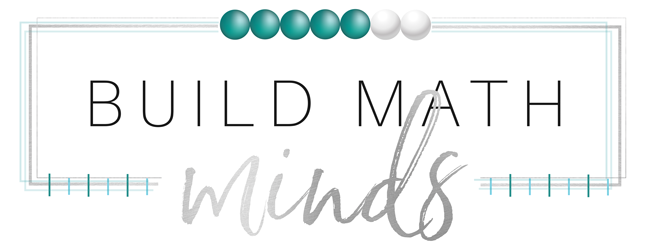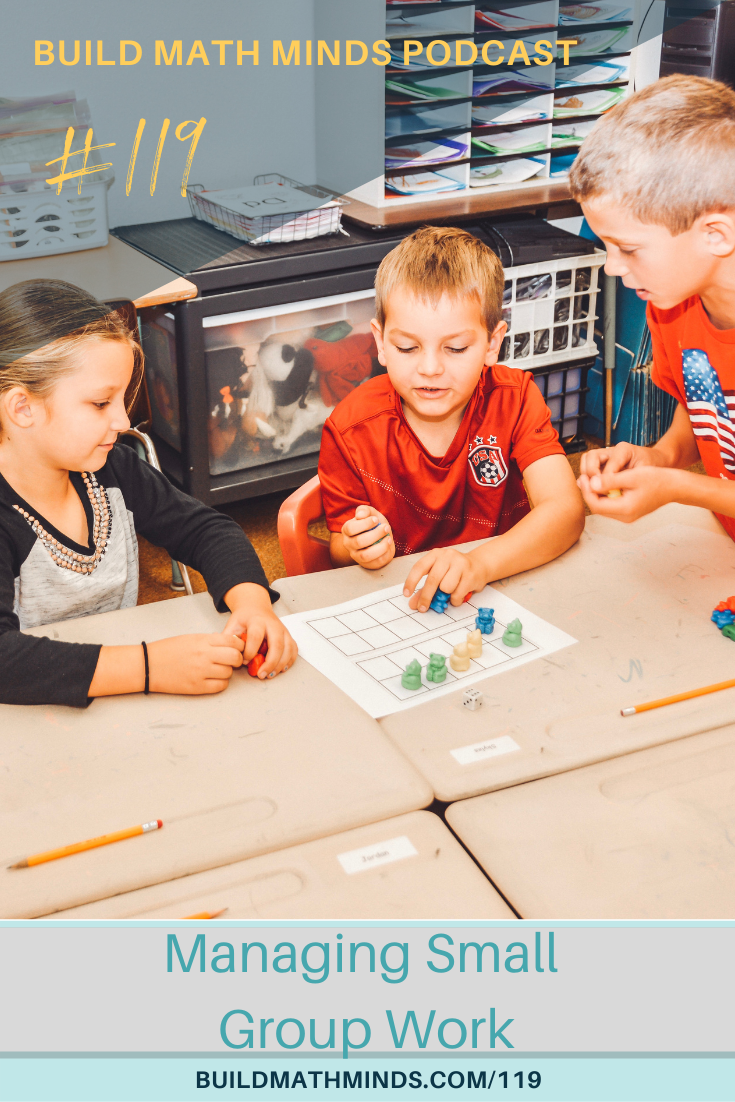Resources mentioned in this episode:
Join the Build Math Minds Facebook Group
Learn about membership in the Build Math Minds PD site
Welcome fellow Recovering Traditionalists to Episode 119. Today we are taking a look at Managing Small Group Work.
Teachers are struggling with the vast differences in mathematical understandings in their classrooms this year. We’ve always had students who were at different points in their mathematical understandings, but this year it seems unmanageable to a lot of educators.
Twice a week, I do Q & A sessions with the members of the Build Math Minds PD site and this past week someone asked me a question that I felt deserved an answer from more than just me. So I put a post inside the free Build Math Minds Facebook group that has over 67,000 members to see what ideas I could curate from the group and the Build Math Minds community delivered.
So much so that it was recommended that I create the answers to be turned into a podcast episode.
The question that started it all was this: How are elementary level teachers able to do remedial/small group work with students when there are no additional adults to assist?
Some of the big things I saw mentioned multiple times were:
-You must use structure & routine. Spend lots of time working on expectations (like a month), go over the structure of how it all works, and make sure it’s routine so it’s not different all the time.
-Have the students help you create and write the expectations.
-Make sure what you have the other kids doing during independent stations can actually be done independently.
-Practice doing the ‘independent work stations.” Especially teaching kids when and when not to interrupt the teacher and to use their resources around them before coming to the teacher for help (Ask 3 before Me was mentioned).
-Do daily check-ins or exit tickets to get a sense of what they need the next day in the groups.
-Watch the time at each station…too short and there isn’t enough time to go deep in your group time, too long and the kids in the independent groups start to be off task. So just pay attention and adjust accordingly.
-Have consistent centers. Teacher-led group and then some other suggestions were: adaptive tech, steam, independent practice based on the day before’s work, choice-based work, fluency work/games, spiral review, partner coaching, problem solving tasks, strategy games (eg. mancala), and number sense building (eg. open middle, EstiMysteries). Andrea even uses an acronym for hers:
“I use MATH.
M= meet w/teacher
A= at desk
T= technology
H= hands on”
Nicole made the point that “The students not with you need engaging things to work on, such as math games. For your sanity, use evergreen games (where the activity stays the same, just the level can get harder as the year progresses and concepts change).”
Tara mentioned using Math Menu with differentiated choices.
This was an interesting idea from Nicole. She said “make sure I leave myself out of the rotation so I can pull anyone from any activity and not have to redo any scheduling.” This idea was interesting to me because every other comment pretty much mentioned having a teacher-led group, but Nicole is saying she is leaving herself out so that she can pull kids from any group or activity. I just recently had the parent-teacher conference with my youngest kiddo’s teacher for this year and she mentioned that she is doing in-class intervention and pulling kids back to do number strings with her.
Kerry’s idea sounds similar to what my kid’s teacher does. She uses “A ‘must-do/may-do’ format, where kids do a main task/game as a whole class, and when they’re done, they do a fluency game that they’ve played before many times for about ten minutes. While they play, I pull a group.”
WISE Professional Development put it this way, “Small group instruction can take place throughout the day, whenever 10 or 15 minutes presents itself. Perhaps the class is completing a whole-class art project or is finishing independent work — pull a group…we need to look for teachable segments throughout the day.”
Corey suggested Peer Assisted Learning Strategies, which can be done incorrectly so make sure to look into the research about the best practices. For those of you who are members of the Build Math Minds PD site, go watch Kateri Thunder’s Virtual Math Summit session from 2020 about Effective Peer Tutoring.
If you want a record of this list, come on over to buildmathminds.com/119 and download the transcript. We always create a PDF download of every episode for people who prefer to read instead of listen. So if you want the list of the ideas I just shared, go to buildmathminds.com/119, scroll down the page and click the link to download the transcript.
If you like what you have been hearing there are a few ways I would love for you to let me know. The first way is to subscribe to the podcast. If you are listening in iTunes make sure to hit that subscribe button. Also in iTunes I would love for you to leave a review and let me know if you are enjoying the podcast which types of episodes are your favorite. Really just anything to get me feedback about the show and lastly if you are on Instagram or Twitter I would love for you to share when you listen to an episode that you love. Make sure you tag me @buildmathminds and all of those are the ways to let me know that there are actually people out there listening. Thank you so much for letting me be a small part of your math journey
Subscribe and Review in iTunes
While you’re there, don’t forget to leave a review on iTunes too. I would love to know your thoughts and how we can make sure that we give you content that you will really enjoy.
To leave a review, head over to iTunes and click on “Ratings and Reviews” and “Write a Review.” I can’t wait to hear your thoughts about the podcast.




